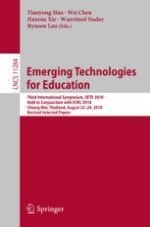2018 | OriginalPaper | Chapter
Applying Diffusion of Innovation Theory to Learning Management System Feature Implementation in Higher Education: Lessons Learned
Authors : Adriana Botha, Hanlie Smuts, Carina de Villiers
Published in: Emerging Technologies for Education
Publisher: Springer International Publishing
Activate our intelligent search to find suitable subject content or patents.
Select sections of text to find matching patents with Artificial Intelligence. powered by
Select sections of text to find additional relevant content using AI-assisted search. powered by
